How Social Science Helps Us Understand Lives in Society
VerifiedAdded on 2023/06/15
|6
|1683
|466
Essay
AI Summary
This essay explores the concept of social science and its significance in understanding individual and collective lives within society. It emphasizes how social science aids in comprehending the relationships between people, societies, and cultures, including the influence of ethnicity and social groups. The discussion covers various branches of social science, such as anthropology, psychology, sociology, economics, and political science, highlighting their importance in addressing practical issues and fostering informed citizenship. Furthermore, the essay underscores the role of social sciences in promoting cultural understanding, respect, and a sense of responsibility towards the human society. Desklib offers a platform to access this essay and similar resources for students.
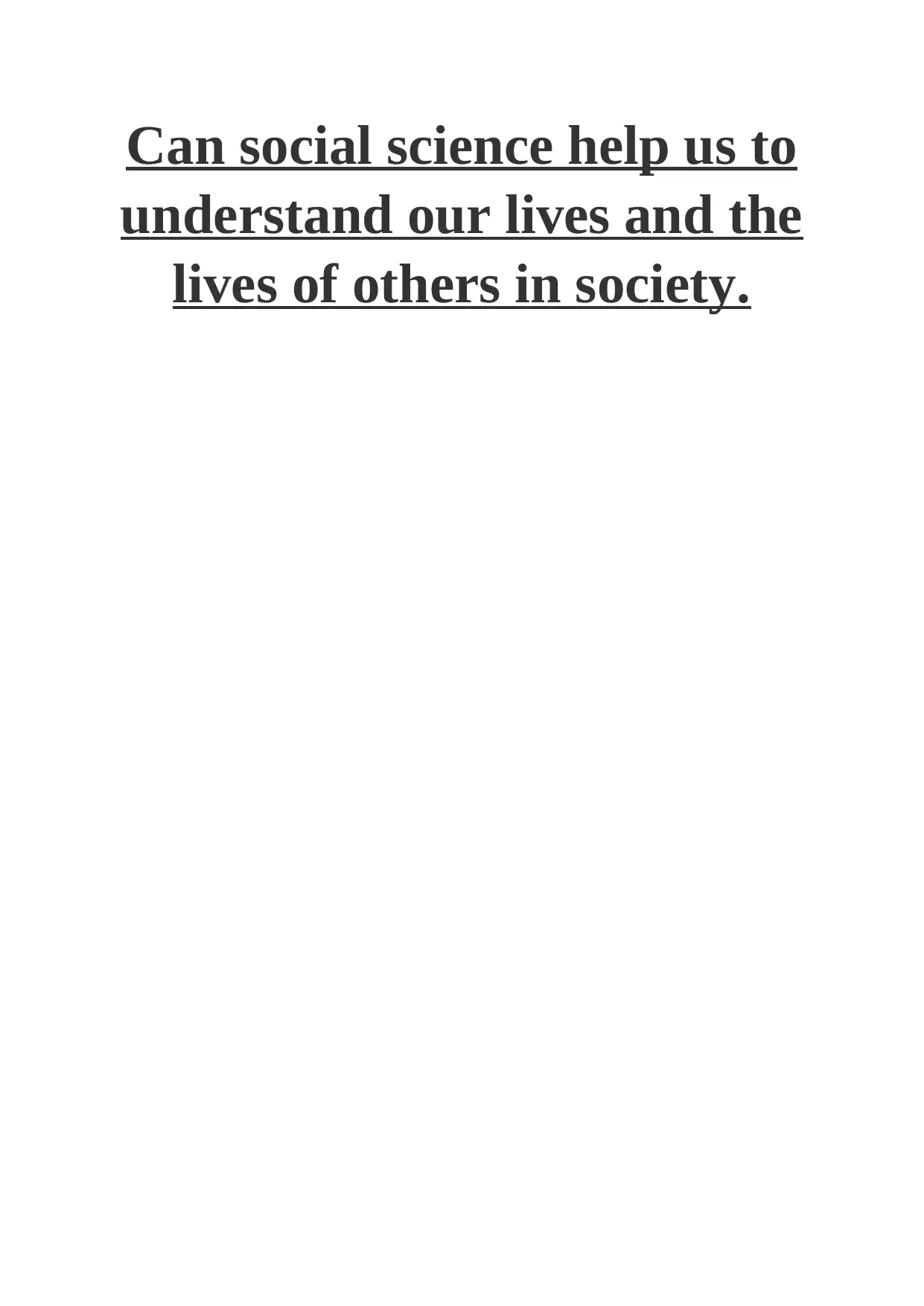
Can social science help us to
understand our lives and the
lives of others in society.
understand our lives and the
lives of others in society.
Paraphrase This Document
Need a fresh take? Get an instant paraphrase of this document with our AI Paraphraser

Table of Contents
INTRODUCTION....................................................................................................................3
MAIN BODY............................................................................................................................3
CONCLUSION.........................................................................................................................3
REFERENCES.........................................................................................................................3
INTRODUCTION....................................................................................................................3
MAIN BODY............................................................................................................................3
CONCLUSION.........................................................................................................................3
REFERENCES.........................................................................................................................3
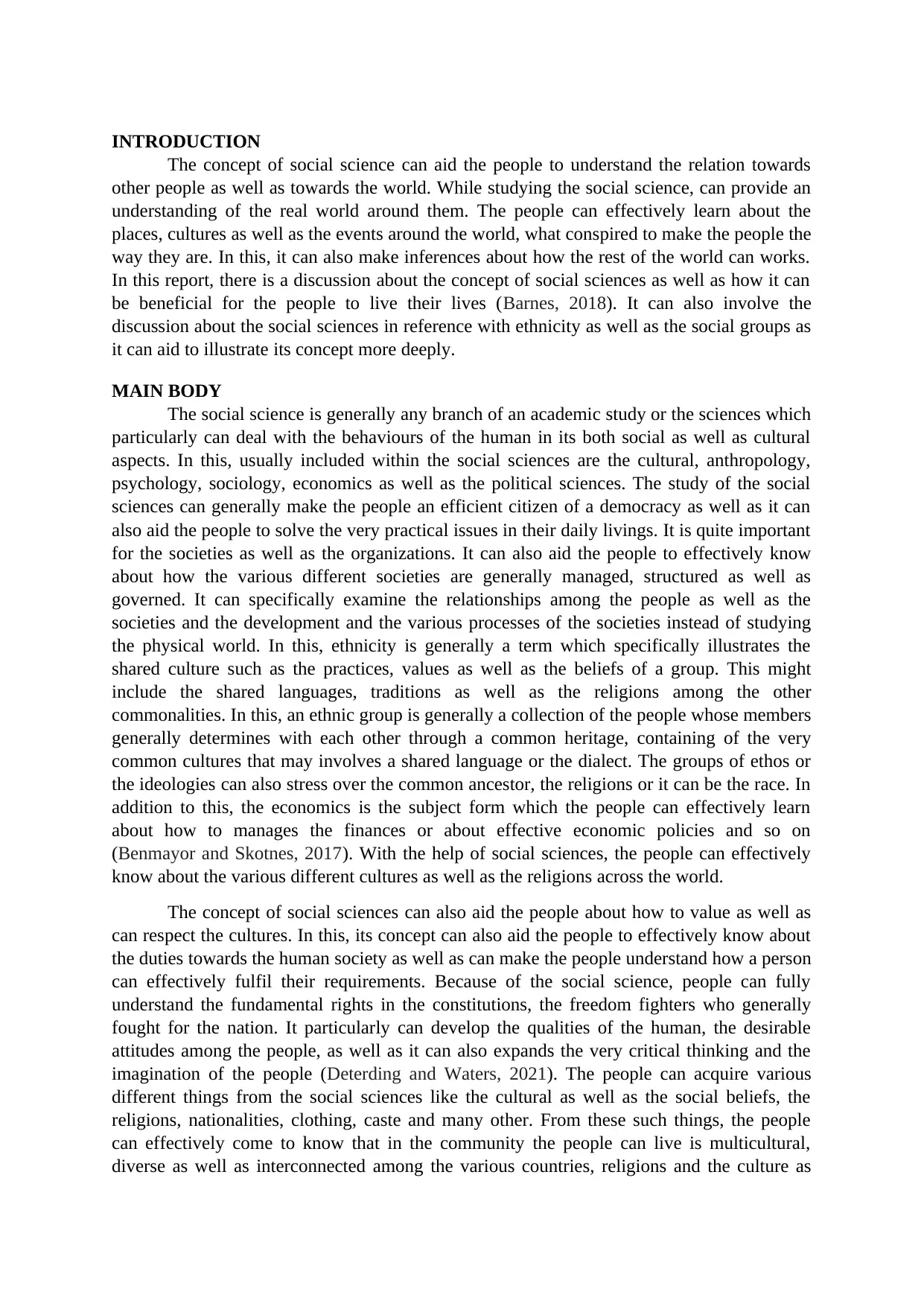
INTRODUCTION
The concept of social science can aid the people to understand the relation towards
other people as well as towards the world. While studying the social science, can provide an
understanding of the real world around them. The people can effectively learn about the
places, cultures as well as the events around the world, what conspired to make the people the
way they are. In this, it can also make inferences about how the rest of the world can works.
In this report, there is a discussion about the concept of social sciences as well as how it can
be beneficial for the people to live their lives (Barnes, 2018). It can also involve the
discussion about the social sciences in reference with ethnicity as well as the social groups as
it can aid to illustrate its concept more deeply.
MAIN BODY
The social science is generally any branch of an academic study or the sciences which
particularly can deal with the behaviours of the human in its both social as well as cultural
aspects. In this, usually included within the social sciences are the cultural, anthropology,
psychology, sociology, economics as well as the political sciences. The study of the social
sciences can generally make the people an efficient citizen of a democracy as well as it can
also aid the people to solve the very practical issues in their daily livings. It is quite important
for the societies as well as the organizations. It can also aid the people to effectively know
about how the various different societies are generally managed, structured as well as
governed. It can specifically examine the relationships among the people as well as the
societies and the development and the various processes of the societies instead of studying
the physical world. In this, ethnicity is generally a term which specifically illustrates the
shared culture such as the practices, values as well as the beliefs of a group. This might
include the shared languages, traditions as well as the religions among the other
commonalities. In this, an ethnic group is generally a collection of the people whose members
generally determines with each other through a common heritage, containing of the very
common cultures that may involves a shared language or the dialect. The groups of ethos or
the ideologies can also stress over the common ancestor, the religions or it can be the race. In
addition to this, the economics is the subject form which the people can effectively learn
about how to manages the finances or about effective economic policies and so on
(Benmayor and Skotnes, 2017). With the help of social sciences, the people can effectively
know about the various different cultures as well as the religions across the world.
The concept of social sciences can also aid the people about how to value as well as
can respect the cultures. In this, its concept can also aid the people to effectively know about
the duties towards the human society as well as can make the people understand how a person
can effectively fulfil their requirements. Because of the social science, people can fully
understand the fundamental rights in the constitutions, the freedom fighters who generally
fought for the nation. It particularly can develop the qualities of the human, the desirable
attitudes among the people, as well as it can also expands the very critical thinking and the
imagination of the people (Deterding and Waters, 2021). The people can acquire various
different things from the social sciences like the cultural as well as the social beliefs, the
religions, nationalities, clothing, caste and many other. From these such things, the people
can effectively come to know that in the community the people can live is multicultural,
diverse as well as interconnected among the various countries, religions and the culture as
The concept of social science can aid the people to understand the relation towards
other people as well as towards the world. While studying the social science, can provide an
understanding of the real world around them. The people can effectively learn about the
places, cultures as well as the events around the world, what conspired to make the people the
way they are. In this, it can also make inferences about how the rest of the world can works.
In this report, there is a discussion about the concept of social sciences as well as how it can
be beneficial for the people to live their lives (Barnes, 2018). It can also involve the
discussion about the social sciences in reference with ethnicity as well as the social groups as
it can aid to illustrate its concept more deeply.
MAIN BODY
The social science is generally any branch of an academic study or the sciences which
particularly can deal with the behaviours of the human in its both social as well as cultural
aspects. In this, usually included within the social sciences are the cultural, anthropology,
psychology, sociology, economics as well as the political sciences. The study of the social
sciences can generally make the people an efficient citizen of a democracy as well as it can
also aid the people to solve the very practical issues in their daily livings. It is quite important
for the societies as well as the organizations. It can also aid the people to effectively know
about how the various different societies are generally managed, structured as well as
governed. It can specifically examine the relationships among the people as well as the
societies and the development and the various processes of the societies instead of studying
the physical world. In this, ethnicity is generally a term which specifically illustrates the
shared culture such as the practices, values as well as the beliefs of a group. This might
include the shared languages, traditions as well as the religions among the other
commonalities. In this, an ethnic group is generally a collection of the people whose members
generally determines with each other through a common heritage, containing of the very
common cultures that may involves a shared language or the dialect. The groups of ethos or
the ideologies can also stress over the common ancestor, the religions or it can be the race. In
addition to this, the economics is the subject form which the people can effectively learn
about how to manages the finances or about effective economic policies and so on
(Benmayor and Skotnes, 2017). With the help of social sciences, the people can effectively
know about the various different cultures as well as the religions across the world.
The concept of social sciences can also aid the people about how to value as well as
can respect the cultures. In this, its concept can also aid the people to effectively know about
the duties towards the human society as well as can make the people understand how a person
can effectively fulfil their requirements. Because of the social science, people can fully
understand the fundamental rights in the constitutions, the freedom fighters who generally
fought for the nation. It particularly can develop the qualities of the human, the desirable
attitudes among the people, as well as it can also expands the very critical thinking and the
imagination of the people (Deterding and Waters, 2021). The people can acquire various
different things from the social sciences like the cultural as well as the social beliefs, the
religions, nationalities, clothing, caste and many other. From these such things, the people
can effectively come to know that in the community the people can live is multicultural,
diverse as well as interconnected among the various countries, religions and the culture as
⊘ This is a preview!⊘
Do you want full access?
Subscribe today to unlock all pages.

Trusted by 1+ million students worldwide
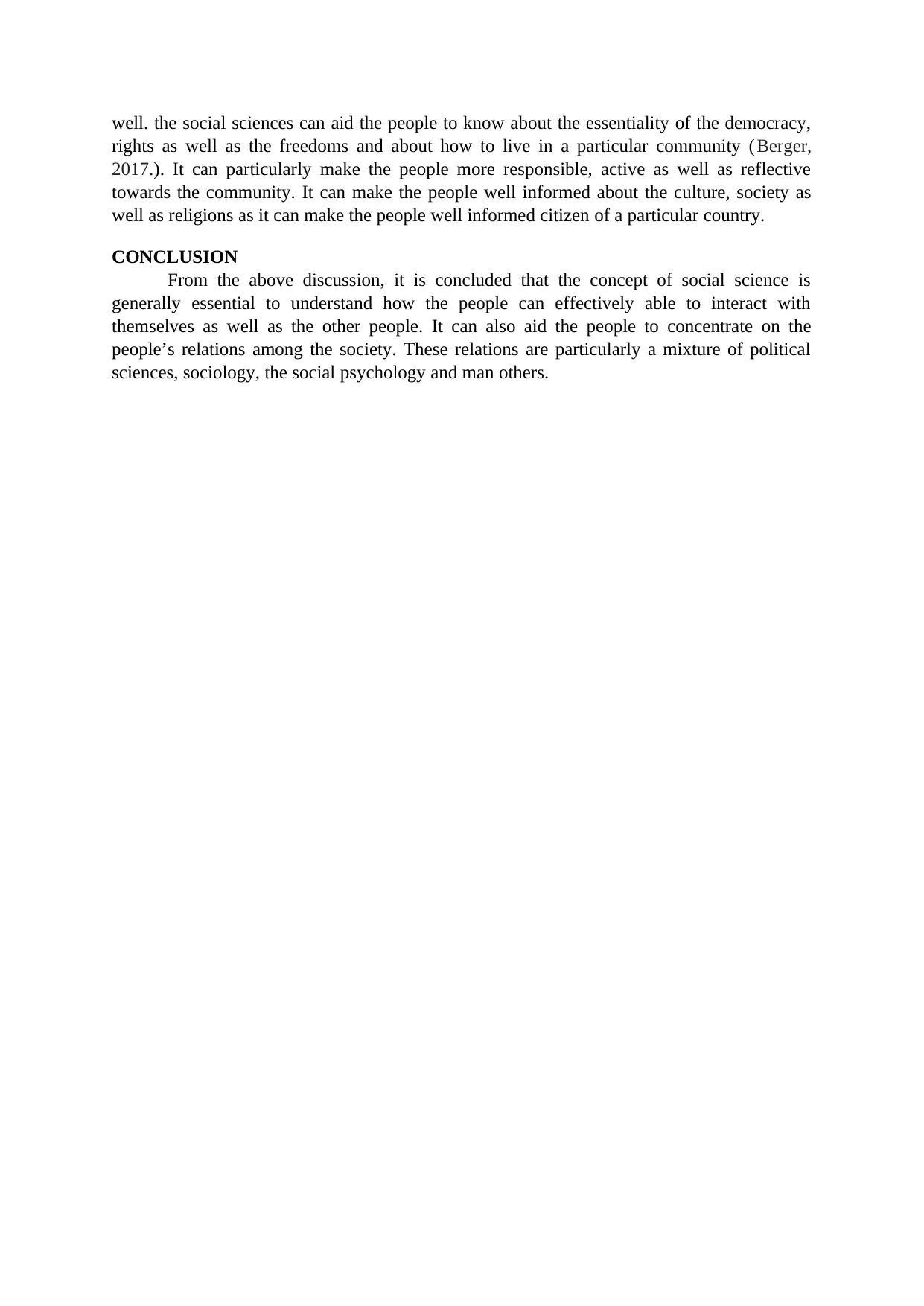
well. the social sciences can aid the people to know about the essentiality of the democracy,
rights as well as the freedoms and about how to live in a particular community (Berger,
2017.). It can particularly make the people more responsible, active as well as reflective
towards the community. It can make the people well informed about the culture, society as
well as religions as it can make the people well informed citizen of a particular country.
CONCLUSION
From the above discussion, it is concluded that the concept of social science is
generally essential to understand how the people can effectively able to interact with
themselves as well as the other people. It can also aid the people to concentrate on the
people’s relations among the society. These relations are particularly a mixture of political
sciences, sociology, the social psychology and man others.
rights as well as the freedoms and about how to live in a particular community (Berger,
2017.). It can particularly make the people more responsible, active as well as reflective
towards the community. It can make the people well informed about the culture, society as
well as religions as it can make the people well informed citizen of a particular country.
CONCLUSION
From the above discussion, it is concluded that the concept of social science is
generally essential to understand how the people can effectively able to interact with
themselves as well as the other people. It can also aid the people to concentrate on the
people’s relations among the society. These relations are particularly a mixture of political
sciences, sociology, the social psychology and man others.
Paraphrase This Document
Need a fresh take? Get an instant paraphrase of this document with our AI Paraphraser
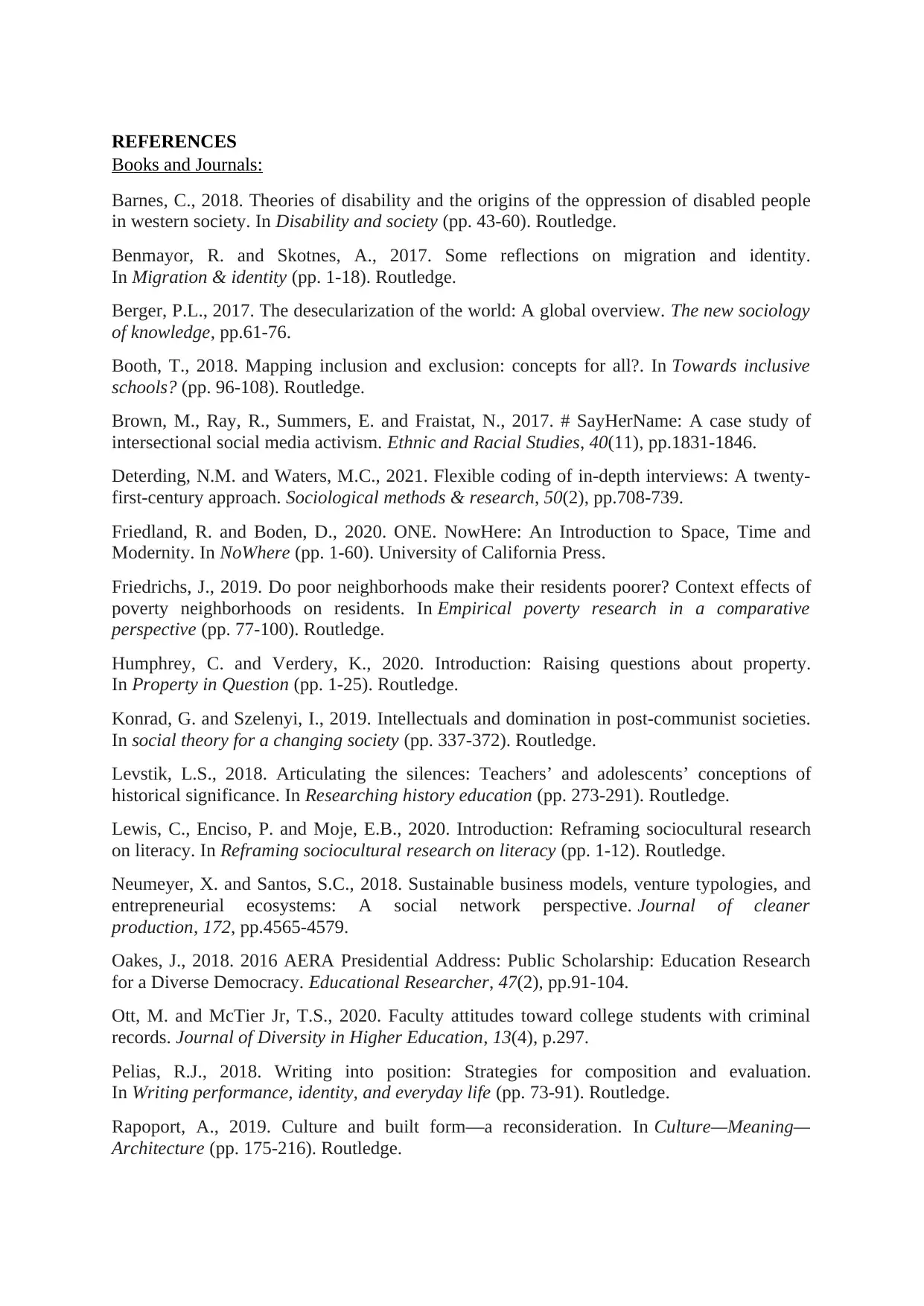
REFERENCES
Books and Journals:
Barnes, C., 2018. Theories of disability and the origins of the oppression of disabled people
in western society. In Disability and society (pp. 43-60). Routledge.
Benmayor, R. and Skotnes, A., 2017. Some reflections on migration and identity.
In Migration & identity (pp. 1-18). Routledge.
Berger, P.L., 2017. The desecularization of the world: A global overview. The new sociology
of knowledge, pp.61-76.
Booth, T., 2018. Mapping inclusion and exclusion: concepts for all?. In Towards inclusive
schools? (pp. 96-108). Routledge.
Brown, M., Ray, R., Summers, E. and Fraistat, N., 2017. # SayHerName: A case study of
intersectional social media activism. Ethnic and Racial Studies, 40(11), pp.1831-1846.
Deterding, N.M. and Waters, M.C., 2021. Flexible coding of in-depth interviews: A twenty-
first-century approach. Sociological methods & research, 50(2), pp.708-739.
Friedland, R. and Boden, D., 2020. ONE. NowHere: An Introduction to Space, Time and
Modernity. In NoWhere (pp. 1-60). University of California Press.
Friedrichs, J., 2019. Do poor neighborhoods make their residents poorer? Context effects of
poverty neighborhoods on residents. In Empirical poverty research in a comparative
perspective (pp. 77-100). Routledge.
Humphrey, C. and Verdery, K., 2020. Introduction: Raising questions about property.
In Property in Question (pp. 1-25). Routledge.
Konrad, G. and Szelenyi, I., 2019. Intellectuals and domination in post-communist societies.
In social theory for a changing society (pp. 337-372). Routledge.
Levstik, L.S., 2018. Articulating the silences: Teachers’ and adolescents’ conceptions of
historical significance. In Researching history education (pp. 273-291). Routledge.
Lewis, C., Enciso, P. and Moje, E.B., 2020. Introduction: Reframing sociocultural research
on literacy. In Reframing sociocultural research on literacy (pp. 1-12). Routledge.
Neumeyer, X. and Santos, S.C., 2018. Sustainable business models, venture typologies, and
entrepreneurial ecosystems: A social network perspective. Journal of cleaner
production, 172, pp.4565-4579.
Oakes, J., 2018. 2016 AERA Presidential Address: Public Scholarship: Education Research
for a Diverse Democracy. Educational Researcher, 47(2), pp.91-104.
Ott, M. and McTier Jr, T.S., 2020. Faculty attitudes toward college students with criminal
records. Journal of Diversity in Higher Education, 13(4), p.297.
Pelias, R.J., 2018. Writing into position: Strategies for composition and evaluation.
In Writing performance, identity, and everyday life (pp. 73-91). Routledge.
Rapoport, A., 2019. Culture and built form—a reconsideration. In Culture—Meaning—
Architecture (pp. 175-216). Routledge.
Books and Journals:
Barnes, C., 2018. Theories of disability and the origins of the oppression of disabled people
in western society. In Disability and society (pp. 43-60). Routledge.
Benmayor, R. and Skotnes, A., 2017. Some reflections on migration and identity.
In Migration & identity (pp. 1-18). Routledge.
Berger, P.L., 2017. The desecularization of the world: A global overview. The new sociology
of knowledge, pp.61-76.
Booth, T., 2018. Mapping inclusion and exclusion: concepts for all?. In Towards inclusive
schools? (pp. 96-108). Routledge.
Brown, M., Ray, R., Summers, E. and Fraistat, N., 2017. # SayHerName: A case study of
intersectional social media activism. Ethnic and Racial Studies, 40(11), pp.1831-1846.
Deterding, N.M. and Waters, M.C., 2021. Flexible coding of in-depth interviews: A twenty-
first-century approach. Sociological methods & research, 50(2), pp.708-739.
Friedland, R. and Boden, D., 2020. ONE. NowHere: An Introduction to Space, Time and
Modernity. In NoWhere (pp. 1-60). University of California Press.
Friedrichs, J., 2019. Do poor neighborhoods make their residents poorer? Context effects of
poverty neighborhoods on residents. In Empirical poverty research in a comparative
perspective (pp. 77-100). Routledge.
Humphrey, C. and Verdery, K., 2020. Introduction: Raising questions about property.
In Property in Question (pp. 1-25). Routledge.
Konrad, G. and Szelenyi, I., 2019. Intellectuals and domination in post-communist societies.
In social theory for a changing society (pp. 337-372). Routledge.
Levstik, L.S., 2018. Articulating the silences: Teachers’ and adolescents’ conceptions of
historical significance. In Researching history education (pp. 273-291). Routledge.
Lewis, C., Enciso, P. and Moje, E.B., 2020. Introduction: Reframing sociocultural research
on literacy. In Reframing sociocultural research on literacy (pp. 1-12). Routledge.
Neumeyer, X. and Santos, S.C., 2018. Sustainable business models, venture typologies, and
entrepreneurial ecosystems: A social network perspective. Journal of cleaner
production, 172, pp.4565-4579.
Oakes, J., 2018. 2016 AERA Presidential Address: Public Scholarship: Education Research
for a Diverse Democracy. Educational Researcher, 47(2), pp.91-104.
Ott, M. and McTier Jr, T.S., 2020. Faculty attitudes toward college students with criminal
records. Journal of Diversity in Higher Education, 13(4), p.297.
Pelias, R.J., 2018. Writing into position: Strategies for composition and evaluation.
In Writing performance, identity, and everyday life (pp. 73-91). Routledge.
Rapoport, A., 2019. Culture and built form—a reconsideration. In Culture—Meaning—
Architecture (pp. 175-216). Routledge.
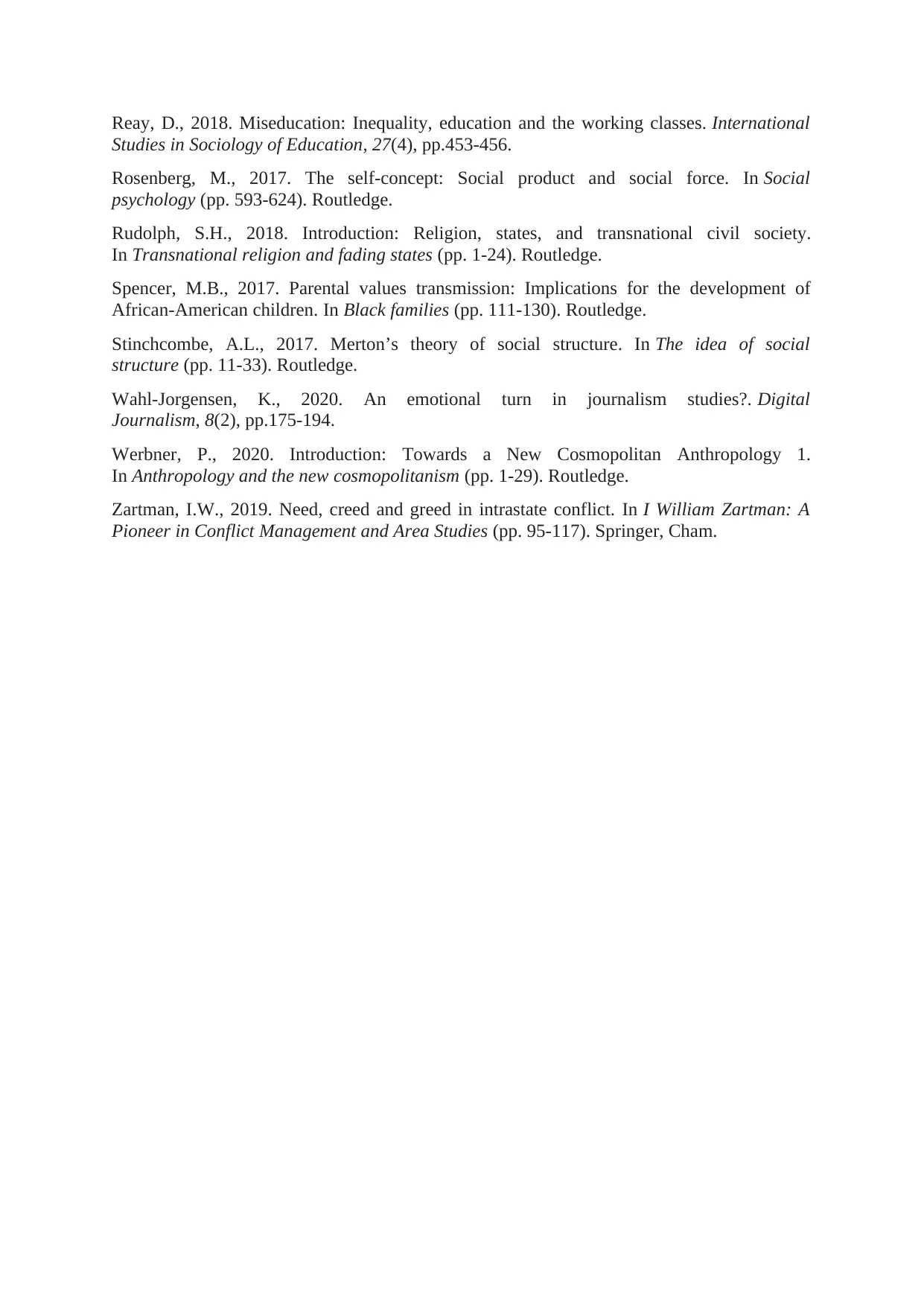
Reay, D., 2018. Miseducation: Inequality, education and the working classes. International
Studies in Sociology of Education, 27(4), pp.453-456.
Rosenberg, M., 2017. The self-concept: Social product and social force. In Social
psychology (pp. 593-624). Routledge.
Rudolph, S.H., 2018. Introduction: Religion, states, and transnational civil society.
In Transnational religion and fading states (pp. 1-24). Routledge.
Spencer, M.B., 2017. Parental values transmission: Implications for the development of
African-American children. In Black families (pp. 111-130). Routledge.
Stinchcombe, A.L., 2017. Merton’s theory of social structure. In The idea of social
structure (pp. 11-33). Routledge.
Wahl-Jorgensen, K., 2020. An emotional turn in journalism studies?. Digital
Journalism, 8(2), pp.175-194.
Werbner, P., 2020. Introduction: Towards a New Cosmopolitan Anthropology 1.
In Anthropology and the new cosmopolitanism (pp. 1-29). Routledge.
Zartman, I.W., 2019. Need, creed and greed in intrastate conflict. In I William Zartman: A
Pioneer in Conflict Management and Area Studies (pp. 95-117). Springer, Cham.
Studies in Sociology of Education, 27(4), pp.453-456.
Rosenberg, M., 2017. The self-concept: Social product and social force. In Social
psychology (pp. 593-624). Routledge.
Rudolph, S.H., 2018. Introduction: Religion, states, and transnational civil society.
In Transnational religion and fading states (pp. 1-24). Routledge.
Spencer, M.B., 2017. Parental values transmission: Implications for the development of
African-American children. In Black families (pp. 111-130). Routledge.
Stinchcombe, A.L., 2017. Merton’s theory of social structure. In The idea of social
structure (pp. 11-33). Routledge.
Wahl-Jorgensen, K., 2020. An emotional turn in journalism studies?. Digital
Journalism, 8(2), pp.175-194.
Werbner, P., 2020. Introduction: Towards a New Cosmopolitan Anthropology 1.
In Anthropology and the new cosmopolitanism (pp. 1-29). Routledge.
Zartman, I.W., 2019. Need, creed and greed in intrastate conflict. In I William Zartman: A
Pioneer in Conflict Management and Area Studies (pp. 95-117). Springer, Cham.
⊘ This is a preview!⊘
Do you want full access?
Subscribe today to unlock all pages.

Trusted by 1+ million students worldwide
1 out of 6
Related Documents
Your All-in-One AI-Powered Toolkit for Academic Success.
+13062052269
info@desklib.com
Available 24*7 on WhatsApp / Email
![[object Object]](/_next/static/media/star-bottom.7253800d.svg)
Unlock your academic potential
Copyright © 2020–2026 A2Z Services. All Rights Reserved. Developed and managed by ZUCOL.


